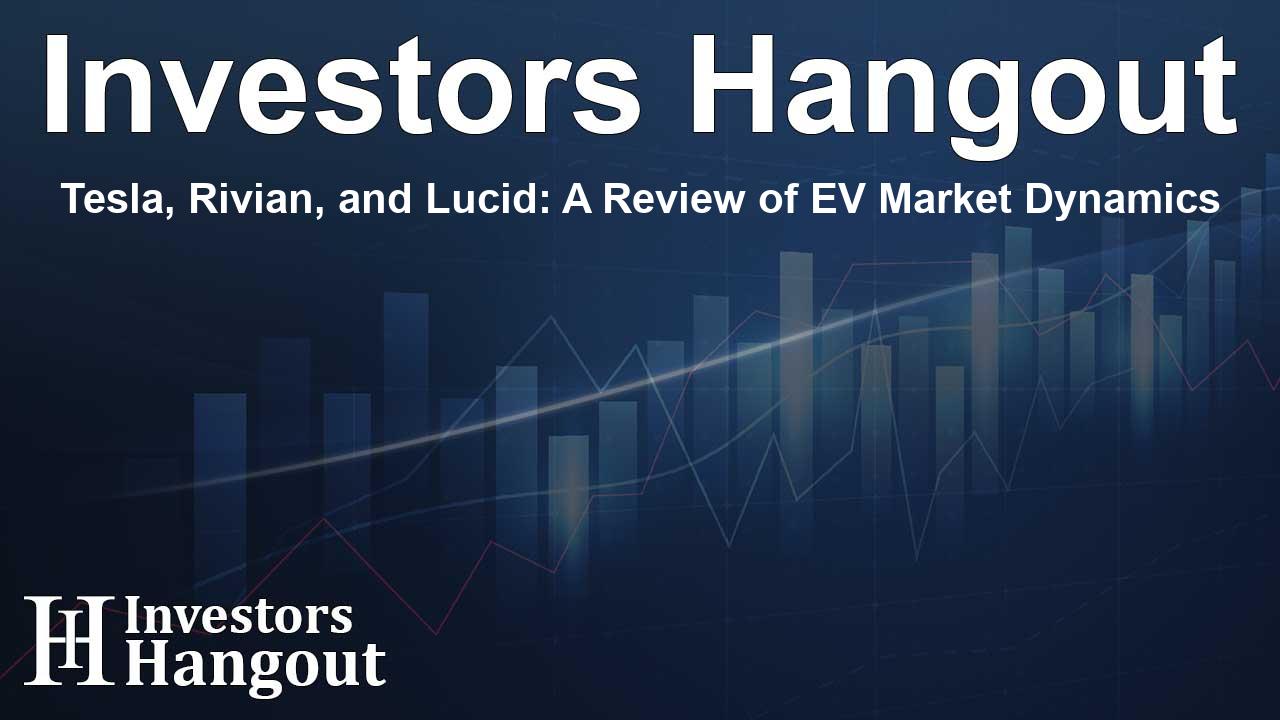Tesla, Rivian, and Lucid: A Review of EV Market Dynamics

Electric Vehicle Market Overview
The electric vehicle (EV) market is buzzing with excitement and competition. Prominent players like Tesla (TSLA), Rivian Automotive (RIVN), and Lucid Group (LCID) are making their mark. However, recent market changes have highlighted significant challenges, especially in meeting consumer demand while facing tough competition.
Tesla: Thriving Despite Obstacles
Tesla has firmly positioned itself as a leader in the global EV market, achieving remarkable sales numbers even amid various challenges. Although its current valuation might seem stretched, I remain hopeful about its future. Tesla’s stock currently trades at a forward price-to-earnings (P/E) ratio of 97, which is approximately 15% lower than its average over the last five years.
After dropping over 40% from its peak in 2021, largely due to declining demand and stronger competition, many investors are reevaluating their stances. Nevertheless, this automaker continues to dominate the market in both sales and innovation.
Financial Performance Insights
In the second quarter, Tesla reported total automotive revenue of $19.8 billion, which is a 7% decline compared to the same quarter last year. In July, delivery figures reached around 443,956 vehicles, showing a 5% drop from the previous year. While these stats might seem disappointing, the operational metrics bring a more optimistic view. Cash from operations surged by 18% year-over-year, reaching $3.61 billion, signaling a rebound from past quarters.
Future Growth Opportunities
Tesla's ambitious growth plans are particularly noteworthy, especially its focus on artificial intelligence, the development of Robotaxis, and robotics innovations. As anticipation grows, the upcoming launch of its Robotaxi could revolutionize its operations and positively impact its stock valuation.
Rivian Automotive: A Promising but Risky Player
Rivian has also grabbed attention with its bold production plans and the possibility of being undervalued in the current market landscape. Despite experiencing a significant drop in value since its 2021 IPO, Rivian’s cash reserves present a compelling opportunity in the automotive industry.
Assessing Financial Stability
With a market capitalization of $13.04 billion and $7.9 billion in cash, Rivian appears relatively stable as it confronts the challenges of boosting production. The company reported a net loss of $1.45 billion in Q2, which is an increase from the previous year, leading to significant quarterly cash burn estimated between $800 million and $1 billion.
Insights from Analysts
Wall Street analysts generally hold a positive view on Rivian, offering a consensus of Moderate Buy ratings. They predict that with the right adjustments in production and operational strategies, Rivian could achieve significant growth.
Lucid Group: Struggling with Significant Hurdles
In contrast, Lucid is having a tough time as it deals with serious financial challenges and a market valuation that's hard to understand. Since its IPO, the company’s market cap has plummeted from over $90 billion to just $8.34 billion.
Challenges in Cost Management
Lucid’s focus on the luxury car segment could be working against it, especially compared to the rising demand for more affordable electric vehicles. The company reported a net loss of $643.3 million in the second quarter, translating to substantial losses per vehicle sold, complicating its future outlook.
Funding and Future Plans
Despite these issues, Lucid’s financial support, particularly from Saudi Arabia’s Public Investment Fund, offers some hope as the company gears up to introduce its new SUV, the Gravity. Priced under $80,000, this new model could reignite consumer interest.
Conclusion: Navigating the EV Landscape
Overall, Tesla stands out in this competitive landscape, showcasing impressive growth potential through its innovations in AI and vehicle technology. While Rivian, despite facing risks, remains an appealing option as it aims for profitability and scalability, Lucid's difficulties and high valuations suggest a more cautious approach in such a demanding EV market.
Frequently Asked Questions
What is Tesla's current market position in the EV industry?
Tesla remains the leading EV manufacturer in the world, but it faces challenges in keeping its competitive edge.
How does Rivian compare to Tesla in terms of valuation?
Rivian's valuation might seem appealing post-IPO decline, but it still has a higher price-to-sales (P/S) ratio than Tesla.
Why is Lucid Group struggling financially?
Lucid has seen a drastic fall in its market capitalization along with increasing costs, leading to significant net losses.
What are the future prospects for Tesla?
Tesla's investments in AI and the introduction of innovations like Robotaxis are expected to power its growth moving forward.
What should investors consider about Rivian's performance?
Investors ought to balance Rivian's ambitious projections against its ongoing financial losses and high cash burn rates.
About The Author
Contact Ryan Hughes privately here. Or send an email with ATTN: Ryan Hughes as the subject to contact@investorshangout.com.
About Investors Hangout
Investors Hangout is a leading online stock forum for financial discussion and learning, offering a wide range of free tools and resources. It draws in traders of all levels, who exchange market knowledge, investigate trading tactics, and keep an eye on industry developments in real time. Featuring financial articles, stock message boards, quotes, charts, company profiles, and live news updates. Through cooperative learning and a wealth of informational resources, it helps users from novices creating their first portfolios to experts honing their techniques. Join Investors Hangout today: https://investorshangout.com/
The content of this article is based on factual, publicly available information and does not represent legal, financial, or investment advice. Investors Hangout does not offer financial advice, and the author is not a licensed financial advisor. Consult a qualified advisor before making any financial or investment decisions based on this article. This article should not be considered advice to purchase, sell, or hold any securities or other investments. If any of the material provided here is inaccurate, please contact us for corrections.
